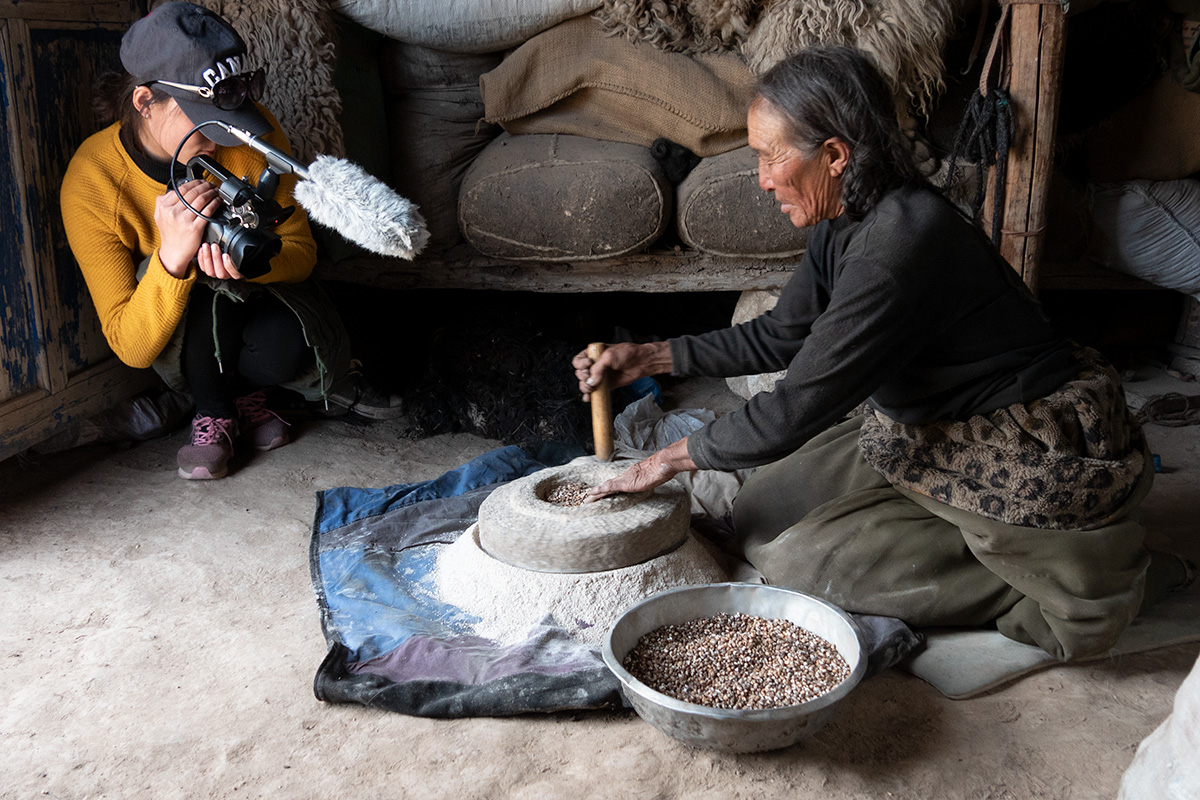The Smithsonian Center for Folklife and Cultural Heritage is proud to present the first of its kind massive open online course (MOOC) teaching intangible cultural heritage documentation entirely in Tibetan.
Methods and Techniques for Documenting and Preserving Tibetan Culture is available now on the SmithsonianX platform. Developed collaboratively with and taught by Tibetan instructors, the MOOC introduces students to some of the practical skills of intangible cultural heritage documentation with an eye toward long-term preservation.
The course uses the Smithsonian Folklife and Oral History Interview Guide (translated into Tibetan) as its main text. Case studies build on materials from the Nomad Material Culture Documentation project housed at the Ralph Rinzler Folklife Archives and Collections.
In recent years, as traditional cultures around the world disappear at alarming rates, UNESCO has placed increasing emphasis on safeguarding, preserving, and promoting the long-term sustainability of intangible cultural heritage traditions. Fieldworkers can play a critical role in this effort by supporting archivists. While folklorists, anthropologists, and other fieldworkers regularly document intangible cultural heritage, the quality varies considerably, presenting a missed opportunity to contribute to long-term archiving and cultural sustainability. This course offers a new generation of future fieldworkers the knowledge and technical skills required to ensure that their work benefits the vitality of the traditions documented, and that the archives and repositories where the materials are kept are of the requisite quality.
The course is taught at an introductory level in the Tibetan language.
For additional details, feedback, or to discuss ways of using the course, please contact us at CFCH-Rigzin@si.edu.

གཏམ་བཟང་།བོད་ཡིག་བོད་སྐད་ནང་ཡིན་པའི་རིག་གནས་བསྡུ་འཇུག་དང་ཉར་ཚགས་སྐོར་གྱི་དྲ་ཐོག་སློབ་ཁྲིད་ལ་ད་ལྟ་རིན་མེད་ངང་ཞུགས་ཆོག།
ཨ་རིའི་སི་མེ་ཟོ་ཉན་དམངས་སྲོལ་དང་རིག་གནས་ཤུལ་བཞག་རྒྱུད་འཛིན་ལྟེ་གནས་གྱིས་བཟོས་བའི་ཆེས་ཐོག་མའི་བོད་ཡིག་བོད་སྐད་ཀྱི་དྲ་ཐོག་སློབ་ཁྲིད་ཆེན་མོ (MOOC) སྟེ་དངོས་མིན་ཤུལ་བཞག་རིག་གནས་བསྡུ་འཇོག་བྱེད་པའི་སྐོར་གྱི་སློབ་ཁྲིད་ཞིག་ད་ལྟ་རྒྱ་ཆེའི་མི་དམངས་ཀྱི་མིག་མདུན་དུ་འགྲེམས་སྤེལ་བྱེད་རྒྱུ་ཡིན།
ང་ཚོའི་དྲ་ཐོག་སློབ་ཁྲིད་འདིའི་མིང་ལ་རིག་གནས་བསྡུ་འཇུག་དང་ཉར་ཚགས་བྱེད་པའི་ཐབས་ལམ་མདོར་བསྡུས་ཞེས་ཟེར་ཞིང་ད་ལྟ SmithsonianX ཞེས་པའི་གླེང་སྟེགས་སྟེང་ན་ཡོད།སློབ་ཚན་འདི་དག་ནི་ང་ཚོའི་ལས་ཁུངས་དང་བོད་ཀྱི་དགེ་རྒན་འགའ་མཉམ་འབྲེལ་བྱས་ཏེ་བཟོས་པ་ཡིན་པ་མ་ཟད་བོད་ཀྱི་དགེ་རྒན་འདི་དག་གིས་བོད་ཡིག་བོད་སྐད་ནས་སློབ་ཁྲིད་བྱས་པ་ཞིག་ཡང་ཡིན།སློབ་ཚན་འདི་དག་གིས་སློབ་མ་རྣམས་ལ་ཤུལ་བཞག་རིག་གནས་བསྡུ་འཇོག་བྱེད་པར་ངེས་པར་དགོས་པའི་ཁ་ཐོག་ལག་གཞག་གི་ལག་རྩལ་དག་ངོ་སྤྲོད་བྱེད་ལ་དངོས་མིན་ཤུལ་བཞག་རིག་གནས་སོགས་རྒྱུན་རིང་པོར་ཉར་ཚགས་བྱེད་པའི་སྐོར་ལ་ཡང་ལམ་སྟོན་བྱེད་ཐུབ།
སློབ་ཚན་ཚང་མ་ཨ་རིའི་སི་མེ་ཟོ་ཉན་གྱི་དམངས་སྲོལ་དང་ངག་བརྒྱུད་ལོ་རྒྱུས་ཀྱི་བཅར་འདྲིའི་སྣེ་ཤན་དེབ་ཆུང་ཞེས་པ་བོད་ཡིག་ཏུ་བསྒྱུར་བ་གཞིར་བཞག་བྱས་ཡོད་ལ་དེབ་ཆུང་འདི་ནི་སློབ་ཚན་འདི་དག་གི་དཔེ་དེབ་གཙོ་བོ་ཡང་ཡིན།སློབ་ཁྲིད་ནང་གི་དཔེ་མཚོན་བརྙན་ཐུང་དག་ནི་ང་ཚོའི་ལས་ཁུངས་ཀྱི་ Ralph Rinzlerདམངས་སྲོལ་་ཡིག་ཆ་གཅེས་ཉར་ཁང་ན་ཉར་ཚགས་བྱས་ཡོད་པའི་འབྲོག་པའི་རྫས་ཡོད་རིག་གནས་བསྡུ་འཇོག་གི་ལས་གཞི་དེར་གཞི་བཞག་བྱས་པ་ཡིན།
འཛམ་གླིང་སྟེངགི་སྲོལ་རྒྱུན་རིག་གནས་དག་ནི་ཧ་ཅང་མགྱོགས་པོའི་ངང་ནས་བོར་གླག་དུ་འགྲོ་བཞིན་པའི་དུས་སྐབས་འདི་ལ།UNESCO ཡིས་དངོས་མིན་ཤུལ་བཞག་རིག་གནས་སྲོལ་རྒྱུན་སོགས་ལ་ཡུན་རིང་རྒྱུན་འཛིན་ཐུབ་པའི་སྒོ་ནས་ཉེན་སྲུང་དང་།ཉར་ཚགས་།གོང་སྤེལ་གཏོང་བ་སོགས་ཀྱི་ཕྱོགས་ལ་ནན་བཤད་ཡང་ཡང་བྱེད་བཞིན་ཡོད།ཡུལ་དངོས་ཞིབ་འཇུག་མཁན་རྣམས་ཀྱིས་ཡིག་ཆ་བདག་གཉེར་མཁན་རྣམས་ལ་ལས་གཞི་འདིའི་ཐད་ནས་རྒྱབ་སྐྱོར་བྱེད་པར་གལ་ཆེན་བྱེད་ནུས་ཐོན་ཐུབ།རྒྱུ་མཚན་ནི་དམང་སྲོལ་རིག་པའི་མཁས་པ་ཡིན་ནའང་འདྲ།མི་རྒྱུད་དཔྱད་རིག་མཁས་པ་ཡིན་ནའང་འདྲ།ཡང་ན་ཡུལ་དངོས་ཞིབ་འཇུག་མཁན་གཞན་པ་དག་ཡིན་ནའང་འདྲ།ཁོང་ཚོ་ཚང་མའི་དུས་རྒྱུན་དུ་དངོས་མིན་ཤུལ་བཞག་རིག་གནས་བསྡུ་འཇོག་བྱེད་སྐབས།ཁོང་ཚོའི་བསྡུ་འཇོག་དང་ཉར་ཚགས་བྱས་པའི་རྒྱུ་ཆའི་སྤུས་ཀ་ནི་རྣམ་པ་སྣ་ཚོགས་ཡིན་སྲིད་ལ་ཐ་ན་ཆ་སྐྱེན་དང་མི་མཐུན་པས།ཁོང་ཚོའི་བསྡུ་འཇོག་བྱས་པའི་རྒྱུ་ཆ་འདི་དག་ཡུན་རིང་རྒྱུན་འཛིན་ཐུབ་པའི་སྒོ་ནས་ཉེན་སྲུང་དང་ཉར་ཚགས་་བྱེད་པའི་གོ་སྐབས་དེ་རྩ་བ་ནས་མེད་པ་བཟོས་ཡོད་པ་རེད།དེ་བས་སློབ་ཁྲིད་འདི་བརྒྱུད་ནས་རིག་གནས་བསྡུ་འཇུག་དང་ཉར་ཚགས་སྐོར་གྱི་ཚད་ལྡན་གྱི་ཤེས་བྱ་དང་ཆེད་ལས་ལག་རྩལ་མང་པོ་ཞིག་མ་འོངས་པའི་མི་རབས་གསར་བའི་ཡུལ་དངོས་ཞིབ་འཇུག་མཁན་རྣམས་ལ་མཚམས་སྦྱོར་བྱས་ཏེ་ཚད་ལྡན་གྱི་ཡུལ་དངོས་ཞིབ་འཇུག་མཁན་བསྐྱེལ་སྲིང་བྱེད་ཐུབ། མ་འོངས་པར་མི་འདི་དག་གིས་རིག་གནས་བསྡུ་འཇུག་གི་ལས་ཀ་གཉེར་དུས ་ཁོང་ཚོའི་བསྡུ་འཇུག་བྱས་པའི་སྲོལ་རྒྱུན་རིག་གནས་ཞིབ་འཇུག་གི་གྲུབ་འབྲས་དག་ནི་ཚད་ལྡན་ཡིན་ལ། ཁོང་ཚོའི་ཞིབ་འཇུག་གི་གྲུབ་འབྲས་དག་གཅེས་ཉར་ཁང་དང་གཏེར་མཛོད་ཁང་སོགས་སུ་ཚད་ལྡན་དུ་ཉར་ཚགས་བྱེད་ཐུབ་པའི་རེ་བ་སྙེག་ཡོད།
སློབ་ཚན་འདི་དག་ནི་ངོ་སྤྲོད་རིམ་པའི་ཚད་གཞི་ནས་བོད་སྐད་ནང་དཔེ་ཁྲིད་བྱས་ཡོད།
སློབ་ཁྲིད་འདིའི་སྐོར་ལ་བསམ་ཚུལ། འདི་ཅི་ལྟར་བཀོལ་སྤྱོད་བྱེད་པའི་ཐད་ལ་དྲི་བ། ཡང་ན་བསམ་འཆར་ཅི་ཡོད་རུང་ང་ཚོའི་ཡིག་སྒམ་ CFCH-Rigzin@si.edu.ལ་བསྐུར་རོགས།



